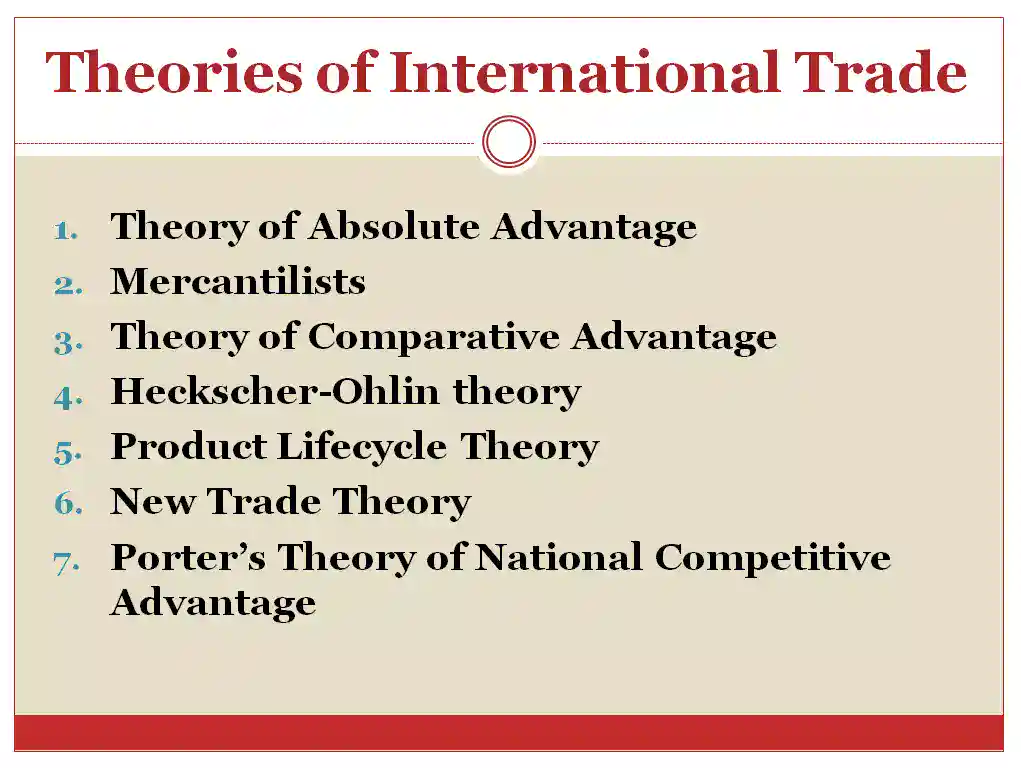Table of Contents:-
- Theories of International Trade
- Implications of International Trade Theories
- International Trade Theories: Comments and Insights
Theories of International Trade
International business traces its origins back to the commencement of international trade operations. The laissez-faire approach in the global economy greatly facilitated these early international trade operations. It improved the well-being of many nations, and the imposition of trade barriers reduced the gains from trade, giving rise to the search for alternate avenues for exporting. The latter led to the formation of foreign subsidiaries through Foreign Direct Investment (FDI). In this context, it is important to understand the factors that influence and impact international trade and foreign direct investment (FDI) on trading partners, multinational companies‘ international operations, and the economies of both home and host countries. Over time, experts have formulated several theories that establish the foundation of international trade.
Emphasis on General Trade Flows
Theories of international trade generally emphasise the salient elements of a complex system. The focus lies on general trade flows rather than specific ones. The twin questions of what are the determinants of trade and what are the related patterns of trade suggest the need to examine various theories of international trade to obtain some answers.
The development of international trade theory has progressed through four distinct phases. The first phase is the pre-classical or mercantilist phase following the Middle Ages till the 1750s or so. Trade theory has evolved through various phases, each offering unique insights. First, there was the Classical phase, which spanned approximately 150 years and coincided with the Industrial Revolution in Europe. Following this, the modern or contemporary trade theory emerged, and eventually, the Neo-classical phase took shape.
The image presents a timeline that highlights when experts proposed the main theories of international trade. Researchers are actively working to revise and enhance existing theories while creating new ones.
Implications of International Trade Theories
There are three main implications of trade theories of international businesses:
1) Location Implications
Underlying most theories is the notion that countries have particular advantages in other productive activities. From a profitability perspective, a company logically chooses to distribute its productive operations to countries where efficiency is at its peak, as the theory of international trade suggests. If designing a product is most efficient in France, then that’s where the design facilities should be located. Similarly, if the manufacturing of basic components is most efficient in Singapore, that’s where they should be produced. Finally, if the most efficient location for the final assembly is in China, then that’s where the final assembly should take place.
A global network of productive activities emerges, where diverse tasks unfold across various worldwide locations, guided by factors such as comparative advantage and resource availability. This intricate web of global operations optimizes efficiency and resource allocation. If the firm does not do this, it may find itself at a competitive disadvantage compared to those firms that take appropriate action.
2) First-Mover Implications
According to the new trade theory, firms that establish a first-mover advantage in the production of a particular new product may subsequently dominate global trade in that product. This is particularly true in industries where the global market can profitably support only a limited number of firms, such as the aerospace sector. However, early commitments also appear to be crucial in less concentrated industries like the market for cellular telephone equipment. For individual firms, the key takeaway is the value of investing significant financial resources in establishing a first-mover or early-mover advantage. This might entail enduring several years of substantial losses before a new venture turns profitable. The rationale behind this approach is to seize the available demand ahead of competitors, secure cost advantages through volume, establish a lasting brand ahead of the competition, and thus, solidify a sustainable, long-term competitive edge.
3) Government Policy Implications
The theories of international trade also matter to international businesses because these firms play a pivotal role in the global trade arena. Business firms produce exports, and business firms import the products from other countries. Because of their pivotal role in international trade, businesses possess the ability to exert significant influence over government trade policies. They engage in lobbying efforts to either advocate for the promotion of free trade or the implementation of trade restrictions. The theories of international trade claim that promoting free trade is generally in a country’s best interests, although it may not always align with the best interests of an individual company. Many firms recognise this and, make an entrance for open markets.
International Trade Theories: Comments and Insights
International trade theories explain why it is beneficial for a country to engage in international trade, and has explained the pattern of international trade observed in the world economy. The theories proposed by Smith, Ricardo, and Heckscher-Ohlin all present compelling arguments in favour of unrestricted free trade. In contrast, the mercantilist doctrine and, to a lesser extent, the new trade theory can be interpreted to support government intervention to promote exports through subsidies and limit imports through tariffs and quotas.
These international trade theories provide valuable perspectives on the complex network of global trade. Although they offer foundational insights, they are not without their limitations. Therefore, it is important to develop a nuanced understanding of these theories to effectively navigate the complexities of international business commerce.
The International trade theories are explained as follows:

1) Theory of Absolute Advantage
The Theory of Absolute Advantage suggests that countries differ in their ability to efficiently produce goods. The theory proposes that a nation should focus on specializing in the production of goods in areas where it possesses an absolute advantage while importing goods from other countries that possess absolute advantages in different areas. This approach allows for optimal resource allocation and promotes economic efficiency.
2) Mercantilists
Mercantilists argued that it was in a country’s best interest to maintain a trade surplus. They viewed trade as a zero-sum game, wherein the gains of one country result in losses for other nations.
3) Theory of Comparative Advantage
The Theory of Comparative Advantage suggests the following:
i) It is logical for a country to specialize in producing goods that it can manufacture most efficiently while procuring goods that it can produce relatively less efficiently from other nations. This holds even if it entails purchasing goods from other countries that it could produce more efficiently domestically.
ii) The theory of comparative advantage indicates that unrestricted free trade brings about increased world production, i.e., that trade is a positive-sum game.
iii) The theory of comparative advantage also suggests that when a country embraces free trade, it fosters economic growth, leading to dynamic gains from trade. Empirical evidence supports this assertion, further reinforcing its validity.
4) Heckscher-Ohlin theory
The Heckscher-Ohlin theory posits that the pattern of international trade is determined by disparities in factor endowments. It predicts that countries will export those goods that make intensive use of locally abundant factors, and will import goods that make intensive use of locally scarce factors.
5) Product Lifecycle Theory
The Product Life cycle Theory suggests that trade patterns are influenced by the location of a new product’s introduction. In an increasingly integrated global economy, the product lifecycle theory appears to have lost some of its predictive power compared to its heyday between 1945 and 1975.
6) New Trade Theory
New Trade Theory states the following points:
i) Trade enables a nation to specialize in the production of specific goods, thereby achieving economies of scale and reducing production costs. Simultaneously, it allows the nation to procure goods that it does not produce from other nations that possess similar specializations. This mechanism leads to an expanded range of goods available to consumers within each nation, while also driving down the average costs of these goods.
ii) The New Trade Theory posits that in industries where significant economies of scale exist, meaning that the global market can only sustain a limited number of firms, certain countries may dominate the export of specific products simply because they were the first to establish a firm in that industry. This theory highlights the importance of being an early entrant in such industries, as it can lead to a competitive advantage and market dominance.
iii) Some new trade theorists have promoted the concept of strategic trade policy. The argument is that by using sophisticated and judicious subsidies, the government can increase the chances of domestic firms becoming first movers in newly emerging industries.
7) Porter’s Theory of National Competitive Advantage
Porter’s Theory of National Competitive Advantage suggests that the pattern of trade is influenced by four attributes of a nation:
- Factor endowments,
- Domestic demand conditions,
- Relating and supporting industries, and
- Firm strategy, structure, and rivalry.
Theories of international trade hold significant importance for individual business firms as they aid in determining the optimal location for their diverse production activities. Firms involved in international trade possess the ability to exert a significant influence on government policies about trade. By lobbying the government, business firms can promote free trade or trade restrictions.
